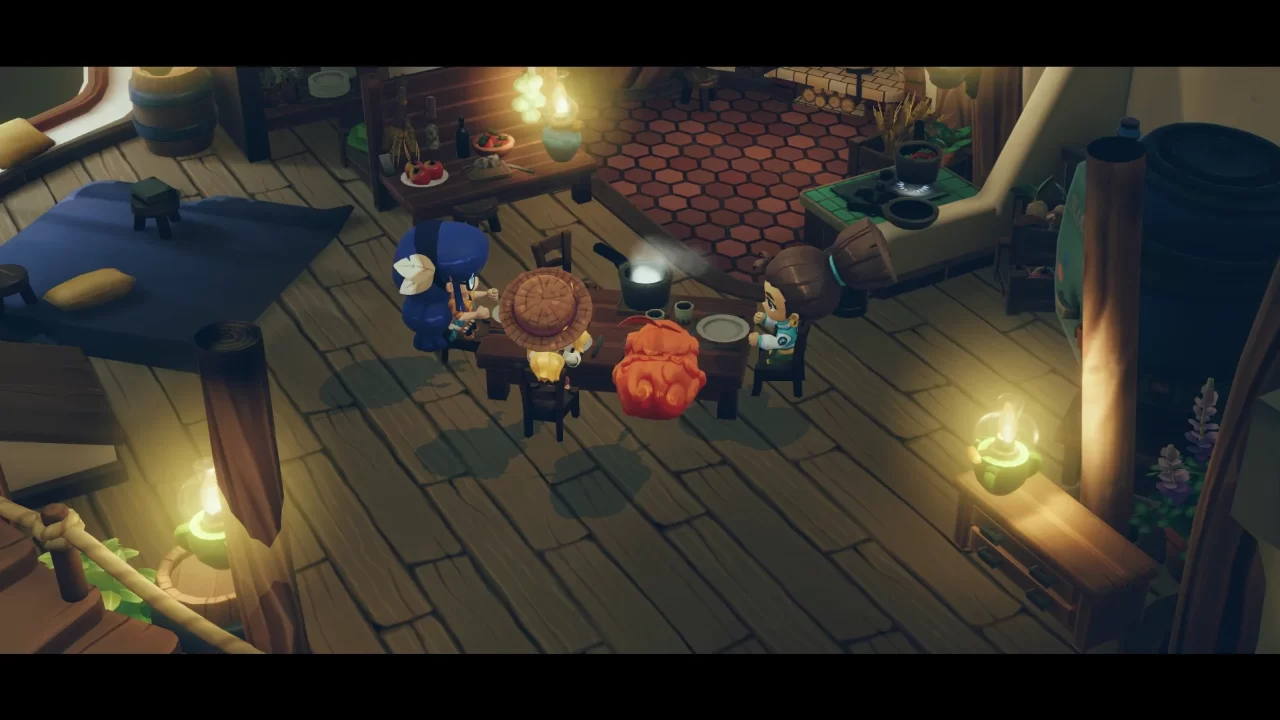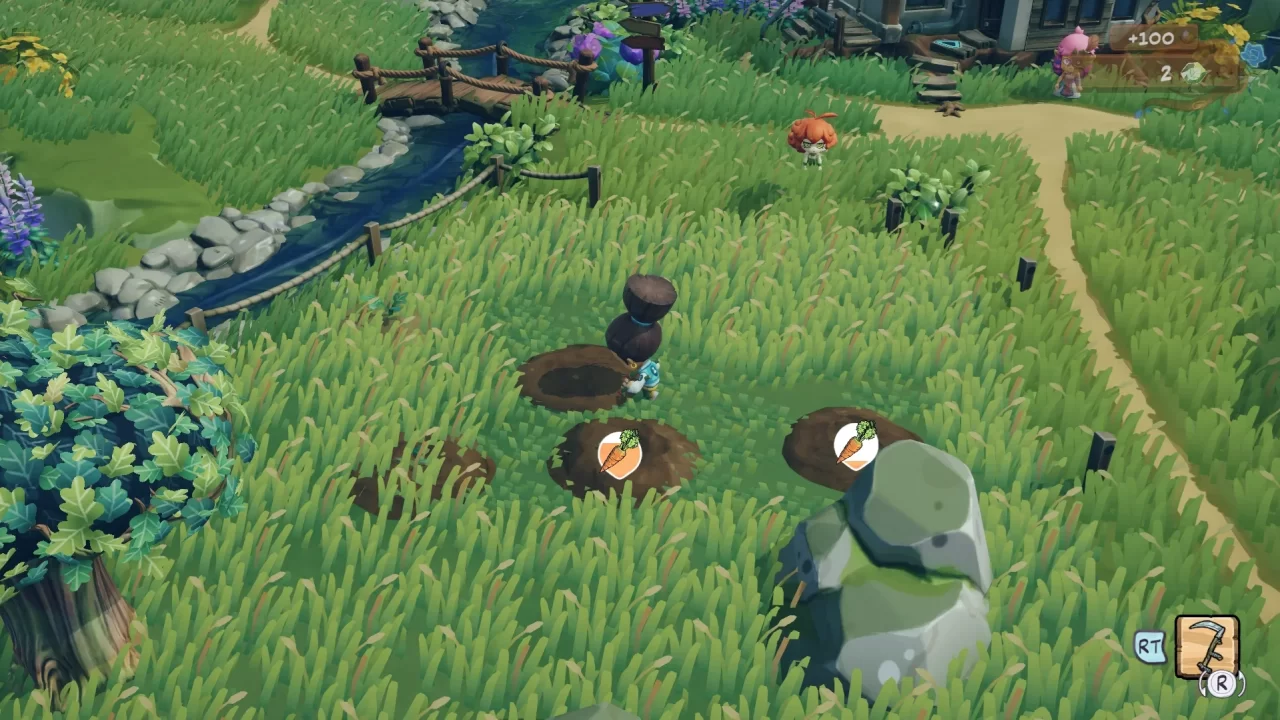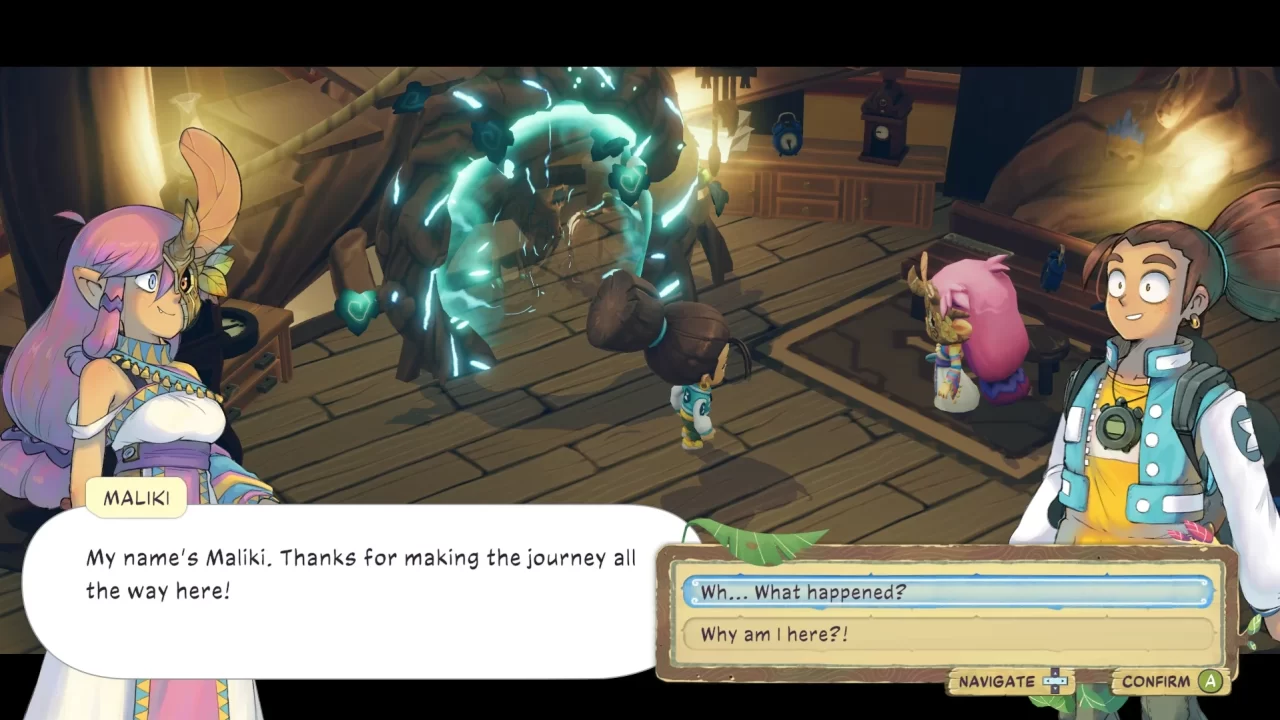The titular character of Maliki: Poison of the Past originates in a French webcomic and should be familiar to its fans. Since I had never experienced Maliki’s adventures before, I came to the game fresh and without preconceptions. I ruined this treasured state immediately by going online and checking out a bunch of the early strips for context. I didn’t read them all (Maliki started publishing in 2007, people), but enough to get a sense of how author and artist Souillon infuses them with anarchic and occasionally surreal comedy. You do not need to be familiar with the source material to appreciate Maliki, as this game presents a side story that highlights the more fantastical elements of the strip, featuring a brand-new protagonist named Sand.
At the outset, Sand gets pulled through a time portal into the company of Maliki’s friends as they battle a creature seemingly parasitised by disturbing plant life, a manifestation of the malevolent entity Poison. Maliki then immediately throws you into gameplay, forcing you to quickly learn the details of its traditional turn-based stylings. You control each character, with the option to use a basic attack, an item, a block command, or a technique (your character’s special abilities), which you gain more of as you level up. Maliki works its time-bending premise into the fabric of the game: you can see the turn order at the top of the screen. Pleasingly, Maliki provides an in-universe explanation for the turn-based mechanics, as Sand’s new companions explain to her that the chrono-shenanigans have portioned time into neat little sections, causing everyone to act one after another instead of all at once.
But just like our heroes, you don’t need to wait for the inevitable to unfold. Sand gains possession of a device that can alter the flow of events, bringing characters’ turns forward or backward. This allows them to work in unison to pull off combo moves or to strike at the same time as an enemy, granting access to defensive techniques. The ability to put a character “behind the timeline,” a state that restores health and points required for your special moves, forms a key function of this system.
This opening gives us an effective use of in media res that ends as everyone realises that Sand has entered the wrong time period, at a point before she has even met them, and they send her further into the past, where the game starts in earnest. Sand meets Maliki, a young woman who wears a wooden half-mask and tracks instances of Poison throughout history using a time portal. Fang, her adopted daughter and the most scientifically minded of the bunch, accompanies her. Then we have Becky, a homely farmer, and Fénimale, a cranky nature fairy. These latter three form the rest of your party. Sand agrees to help them find Poison and stop its evil endeavors.
If you’ve recently played the critically acclaimed RPG Clair Obscur: Expedition 33, you may be in the mood for something that captures the uniquely French atmosphere of that game. If so, I have good news for you: Maliki has more continental content than a freshly loaded baguette. Sand visits locations ranging from little French towns all the way to the City of Love itself, and Maliki: Poison of the Past delivers the feel of those environments through subtle visual clues rather than by hitting you in the face with major landmarks. Maliki doesn’t have the same grim tone and gruelling atmosphere as Expedition 33, even if both deal with potentially world-ending crises.
The Legend of Zelda: Link’s Awakening remake obviously provided significant inspiration for this title. The graphics, which have the same toy-like sheen, use of bright, vibrant colours, and exaggerated character emotes, make this apparent. Maliki also has full-body character portraits with distinct design work and immaculate animation. It’s some of the best work I’ve seen in an indie title. The game clearly benefits from its source material. It draws on the skill of its talented creator, avoiding formulaic appearances.
Like Link’s Awakening, Maliki incorporates puzzle elements into its core gameplay. Each of the four main characters has a unique field ability: Sand manipulates time, Becky activates spring pads and other items by jabbing them with her pitchfork, and Fénimale uses her nature magic to make plants communicate with each other. Fang can move things around with a telekinetic beam, which strongly reminded me of Zelda’s ability in The Legend of Zelda: Echoes of Wisdom. I enjoyed the puzzles when I grasped their logic, although Malki does not always provide you with the right mental toolset to solve them. Couple this with some fiddly positioning requirements and temperamental physics, and you occasionally have a recipe for frustration.
In one area, I repeated the same action multiple times, resulting in failure up until the point it decided to suddenly work. Elsewhere, the solution to the puzzle only functioned when I stood my character right in the middle of the two objects involved. In most cases, the puzzles present enough difficulty to provide a challenge whilst not outstaying their welcome, and they provide a nice break from the turn-based battles.
Some light farming sim elements take place in the central home area known as the “Domaine” and support the main gameplay loop. Here, a magical barrier keeps the effects of Poison at bay, allowing some wholesome vegetation to flourish. Although the thought of playing Animal Crossing brings me out in a rash, planting crops whilst attempting to cultivate a decent harvest is enjoyable and rewards you with a currency called “naturons.” The game does not force you to engage with this minigame if you don’t want to; I’ve no doubt you can finish the experience without ever touching it, so I don’t feel blackmailed into giving up my time for the agricultural cause. You can then feed naturons to a magical tree, which opens up opportunities to fight back Poison and expand the border of the Domaine, providing further motivation for getting your shovel dirty.
Other issues emerge within the game, entwining themselves through the experience like a venomous vine. I played Maliki on Switch, and the framerate suffers from frequent drops into the undergrowth. As someone who played through Echoes of Wisdom and didn’t bat an eye at the problems others noticed, you can be certain that the stuttering image quality does harm the experience. I also encountered multiple game-busting bugs. For instance, I initiated encounters only for the screen to get stuck after fading to white, forcing me to complete a full restart. At times, I only avoided this bug by ensuring I didn’t run down a specific street or by reordering my actions. Fortunately, you can save pretty much anywhere (and the autosave works wonders), so even when this happens, a quick recovery eases the pain like a digital dock leaf.
I am happy to put up with these technical limitations for what the game delivers, though. Souillon’s influence clearly enhances the art and charming characters we encounter. Fang, uniquely loveable as the youngest team member, struggles with questions of self-worth. Becky’s relatively carefree attitude forms a counterpoint to this, and the more we learn about her and the true reason she resides within the domain, the more attached we grow. Fénimale, entertainingly irascible, has an oddly relatable surface contempt for humanity. Sand herself proves less compelling as she plays the role of silent protagonist and blank slate. Although not fully voiced, the performances the actors give in their non-verbal utterances help to bring the characters to life.
The game truly triumphs in its soundtrack, which features a track called “Emanations,” a collaboration with Motoi Sakuraba, probably best known to our readers as the primary composer of the Tales series. While suitably energising, this piece of music was not my favourite in the outstanding selection on offer, created by the band Starrysky. I adore the dark punk song “Glorieuse Dépression,” which plays during a pivotal fight scene where you fight the band performing it and can knock out the backing instruments, similar to a particular battle in Hades II. Perhaps most impressive of all, Maliki’s main theme, “Poison of the Past,” delivers a magical accompaniment to the experience, especially in the vocal version.
Maliki: Poison of the Past feels to me like a bouquet of flowers, with the occasional thorn hidden within its attractive exterior. With the air full of the enticing aroma of blooming petals, you easily forget the one or two moments of discomfort you suffer to appreciate its best qualities. Load it up, take a deep breath, and enjoy.





